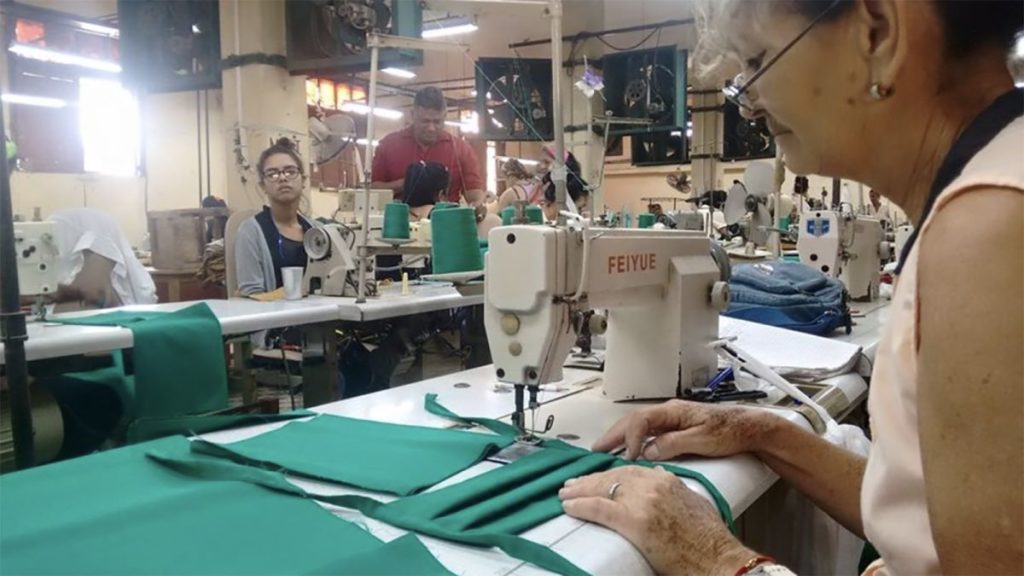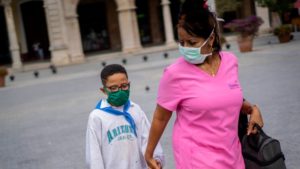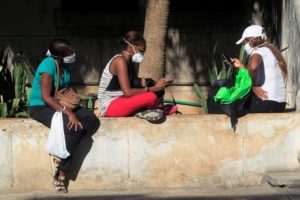 CORONAVIRUS EN CUBA:(Actualizado) CON 716 POSIBLE CASOS REPORTADOS EL GOBIERNO CIERRA LAS FRONTERAS.
CORONAVIRUS EN CUBA:(Actualizado) CON 716 POSIBLE CASOS REPORTADOS EL GOBIERNO CIERRA LAS FRONTERAS.
Desde la noche de ayer se reportan como graves dos pacientes de COVID-19, uno en el Instituto de Medicina Tropical “Pedro Kourí” (IPK), de La Habana, y otro en el Hospital Militar Fermín Valdés Domínguez, de Holguín, dijo este sábado el doctor José Raúl de Armas Fernández, jefe del departamento de Enfermedades Transmisibles del Ministerio de Salud Pública (Minsap).
El equipo médico que los atiende está trabajando intensamente, pero hay que mantener una conducta expectante atendiendo al comportamiento de esta enfermedad, que tiene un curso bastante impredecible, explicó el doctor en conferencia de prensa hoy en La Habana.
El gobernante Miguel Díaz-Canel informó este viernes que la cifra de enfermos con coronavirus en la Isla se elevó a 21, a la par que anunció nuevas medidas para afrontar la crisis, entre ellas el cierre de las fronteras al turismo que había sido ampliamente demandado por la población en los últimos días.
“Vamos a regular la entrada por las fronteras del país, dejando solo autorizada la entrada de los residentes en Cuba, con la flexibilidad de garantizar la cooperación de otros países”, aseguró el gobernante en declaraciones a la televisión estatal.
De los 21 casos que han dado positivo por coronavirus en el país, 10 son cubanos y 11 extranjeros, según informó el ministro de Salud Pública, José Ángel Portal Miranda. En toda la Isla se mantienen ahora mismo 716 personas en “seguimiento” por sospechas de que tengan el Covid-19.
En toda la Isla se mantienen ahora mismo 716 personas en “seguimiento” por sospechas de que tengan el Covid-19
Díaz-Canel anunció también la regulación de entrada en las fronteras, permitiendo solamente el arribo al país de los cubanos que estaban en el exterior y que residan en la Isla y la salida hacia sus países de los turistas y visitantes extranjeros que están ahora mismo en territorio nacional.
El gobernante aseguró que el país aún está en la Fase 1 de la pandemia, es decir, cuando solo se presentan casos confirmados de viajeros o de locales que se vincularon con ellos.
Pero sostuvo que adelantan medidas de la Fase 2 (transmisión autóctona) y Fase 3 (se incrementan los casos sin saber de dónde viene el contagio) a modo preventivo.
El primer ministro, Manuel Marrero, dijo que “solamente habrá salida de turistas. Ya no llegarán más turistas, solo se irán los que están”, subrayó en medio de los crecientes reclamos populares para el cierre de la llegada de vacacionistas.
El primer ministro, Manuel Marrero, dijo que “solamente habrá salida de turistas. Ya no llegarán más turistas, solo se irán los que están”
“No es un cierre de frontera es una regulación de entrada”, precisó Marrero quién agregó que se mantendrán los vuelos internacionales “para propiciar la salida de los extranjeros que están en el país que se calculan en unos 60.000”.
Además anunció que “cerrarán la mayor parte de los hoteles” y que “la semana próxima no habrá un solo turista en Cuba”.
“Los arrendatarios privados que hoy alojan 11 640 turistas, deben apoyar las medidas interesándose por la salida del país de los mismos, teniendo en cuenta la actual situación de las aerolíneas”, precisó.
Sobre los reclamos populares para cerrar las escuelas, Marrero argumentó que es preferible que los niños estén en los centros docentes y “no en la calle” . No obstante, el sector de la educación “ha tomado medidas para reforzar la higiene” en sus instalaciones.
Las medidas entrarán en vigor en 72 horas, el martes de la semana próxima, y las entradas permanecerán cerradas por 30 días, dijo Marrero.
El segundo al mando en el Gobierno cubano explicó que el espacio aéreo permanecerá abierto para los vuelos internacionales que pasen por el país. También dijo que los hoteles cubano cerrarán y los empleados que “queden disponibles”, un eufemismo oficial para referirse al desempleo, serán respaldados por el Gobierno.
A partir del próximo lunes, los espacios públicos que se mantengan abiertos debe haber una zona de higienización con hipoclorito.
Según explicó Betsy Díaz Velázquez, ministra de Comercio Interior, el sector gastronómico reducirá su servicio a un 50% y que las mesas deberán estar colocadas a una distancia de dos metros. “Se mantendrán funcionando los comercios y los servicios gastronómicos pero con la obligatoriedad de cumplir las medidas higiénicas”, afirmó.
Según explicó Betsy Díaz Velázquez, ministra de Comercio Interior, el sector gastronómico reducirá su servicio a un 50%
Además anunciaron el cierre de los parques temáticos, los cabarets y del campismo popular.
La ministra de Trabajo y Seguridad Social, Marta Elena Feitó Cabrera, explicó que ante una interrupción laboral se debe potenciar la reubicación de los trabajadores y que durante el primer mes van a recibir un 100% del salario y que, después, durante el tiempo que dure la pandemia recibirán el 60% del salario.
A las personas hospitalizadas se les pagará el 50% de su salario, en un país donde los sueldo mensuales de la mayoría de los trabajadores no superan el equivalente a los 30 dólares.
Los bancos estatales también brindarán créditos al incipiente sector privado para afrontar los efectos económicos de la pandemia, muy afectado con los recortes que ha traído el coronavirus en el número de visitantes.
 CORONA VIRUS IN CUBA: (UPDATED). WITH 716 POSSIBLE CASES REPORTED GOVERNMENT CLOSED BORDERS.
CORONA VIRUS IN CUBA: (UPDATED). WITH 716 POSSIBLE CASES REPORTED GOVERNMENT CLOSED BORDERS.
As of yesterday night, two COVID-19 patients are reported as serious, one at the “Pedro Kourí” Institute of Tropical Medicine (IPK), in Havana, and the other at the Fermín Valdés Domínguez Military Hospital, in Holguín, said Saturday, Dr. José Raúl de Armas Fernández, head of the Communicable Diseases Department of the Ministry of Public Health (Minsap).
The medical team that cares for them is working intensively, but it is necessary to maintain an expectant behavior taking into account the behavior of this disease, which has a rather unpredictable course, explained the doctor at a press conference today in Havana.
The governor Miguel Díaz-Canel reported this Friday that the number of patients with coronavirus on the Island rose to 21, while he announced new measures to deal with the crisis, including the closure of the borders to tourism that had been widely demanded by the population in the last days.
“We are going to regulate the entry through the country’s borders, leaving only the entry of residents in Cuba authorized, with the flexibility of guaranteeing the cooperation of other countries,” the president said in statements to state television.
Of the 21 cases that have tested positive for coronavirus in the country, 10 are Cuban and 11 are foreigners, as reported by the Minister of Public Health, José Ángel Portal Miranda. Across the Island, 716 people are being kept on “follow-up” right now on suspicion of having the Covid-19.
Across the Island, 716 people are being kept on “follow-up” right now on suspicion of having the Covid-19
Díaz-Canel also announced the regulation of entry into the borders, only allowing the arrival to the country of Cubans who were abroad and who reside on the Island and the departure to their countries of foreign tourists and visitors who are currently in National territory.
The ruler assured that the country is still in Phase 1 of the pandemic, that is when only confirmed cases of travelers or locals who have linked with them appear.
But he maintained that they are advancing measures of Phase 2 (indigenous transmission) and Phase 3 (cases are increasing without knowing where the contagion comes from) as a preventive measure.
Prime Minister Manuel Marrero said that “there will only be tourists leaving. No more tourists will come, only those who leave will go,” he stressed amid growing popular demands for the closure of the arrival of vacationers.
Prime Minister Manuel Marrero said that “there will only be tourists leaving. No more tourists will come, only those who leave will leave.”
“It is not a border closure, it is an entry regulation,” said Marrero, who added that international flights will be maintained “to encourage the departure of foreigners who are in the country, which are estimated at around 60,000.”
He also announced that “most of the hotels will be closed” and that “next week there will not be a single tourist in Cuba.”
“Private tenants who today house 11 640 tourists must support the measures by taking an interest in their departure from the country, taking into account the current situation of the airlines,” he said.
Regarding popular demands to close schools, Marrero argued that it is preferable that children are in educational centers and “not on the street.” However, the education sector “has taken steps to strengthen hygiene” at its facilities.
The measures will take effect in 72 hours on Tuesday of next week, and entrances will remain closed for 30 days, Marrero said.
The second in command in the Cuban Government explained that the airspace will remain open for international flights passing through the country. He also said that Cuban hotels will close and “available” employees, an official euphemism for unemployment, will be backed by the government.
Starting next Monday, public spaces that are kept open must have a sanitizing area with hypochlorite.
As explained by Betsy Díaz Velázquez, Minister of Internal Trade, the gastronomic sector will reduce its service to 50% and that the tables must be placed at a distance of two meters. “The shops and gastronomic services will continue to function but with the obligation to comply with hygiene measures,” he said.
As explained by Betsy Díaz Velázquez, Minister of Internal Trade, the gastronomic sector will reduce its service to 50%
They also announced the closure of theme parks, cabarets, and popular camping.
The Minister of Labor and Social Security, Marta Elena Feitó Cabrera, explained that in the event of a labor interruption, the relocation of workers should be promoted and that during the first month they will receive 100% of the salary and, later, during the time they During the pandemic they will receive 60% of the salary.
Hospitalized people will be paid 50% of their wages, in a country where the monthly wages of most workers do not exceed the equivalent of $ 30.
State banks will also provide loans to the nascent private sector to face the economic effects of the pandemic, which has been greatly affected by the cuts that the coronavirus has brought in the number of visitors.
Agencies/ 14ymedio/ Internet Photos/ Arnoldo Varona/ www.TheCubanHistory.com
THE CUBAN HISTORY, HOLLYWOOD.







